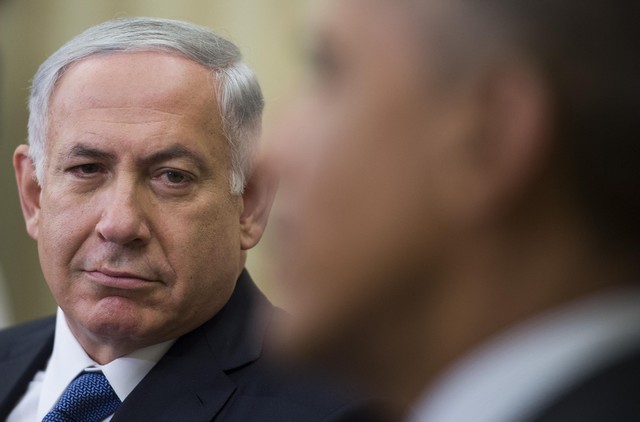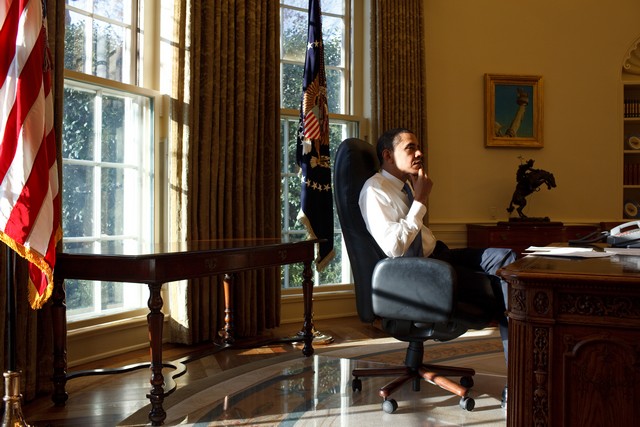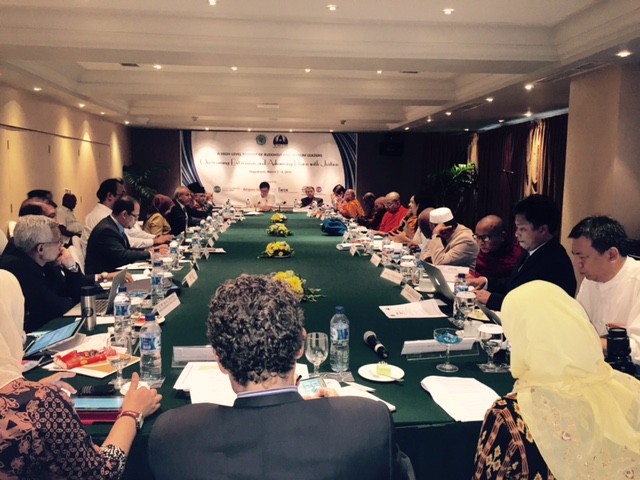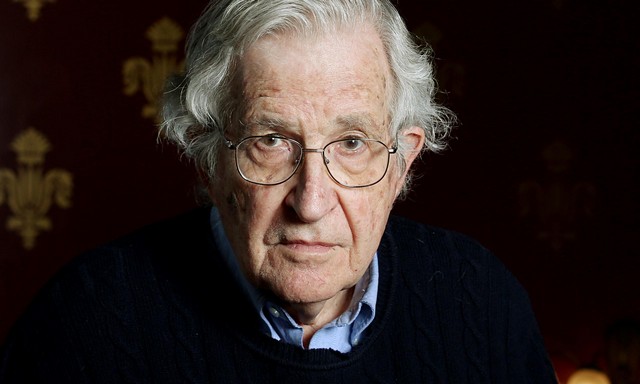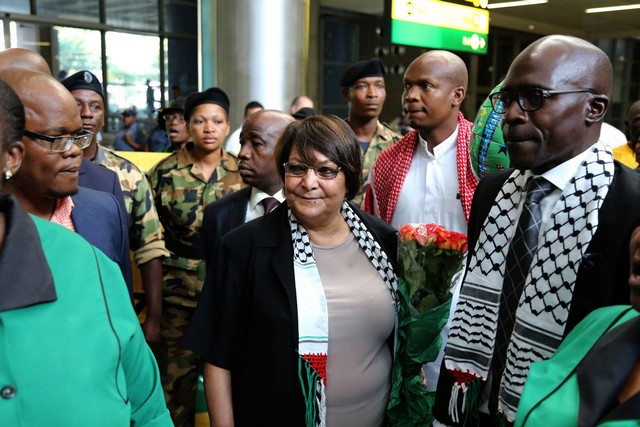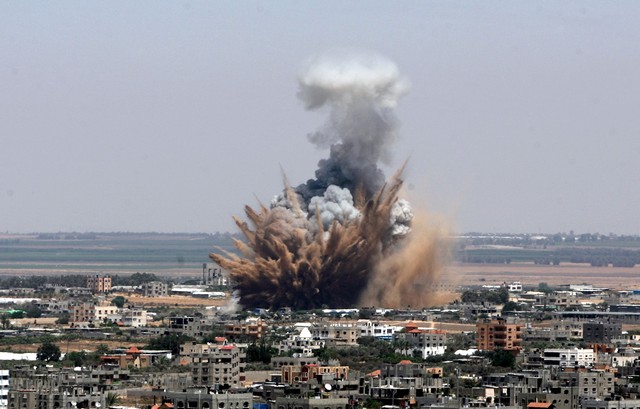Overcoming Extremism and Advancing Peace with Justice
March 3-4, 2015
Yogyakarta and Borobudur Temple
Indonesia
hosted by
Indonesian Buddhist Association (WALUBI) &
Indonesian Council of Ulama (MUI)
organized by
International Forum on Buddhist-Muslim Relations (BMF)
(Core Groups: International Network of Engaged Buddhists,
International Movement for a Just World, Muhammadiyah & Religions for Peace)
FINAL STATEMENT: Shared Values and Commitments
We, Buddhist and Muslim leaders, recognize that our followers have developed together a harmonious relationship, which has become the foundation for building peace and prosperity in many parts of the world. Buddhism and Islam share in their respective scriptures and other canonical texts the importance of holistic and positive peace, which encompasses the notions of inner peace, peace among humans, and peace with nature.
We reaffirm that Islam and Buddhism are religions of mercy and compassion committed to justice for all humankind. Both traditions respect the sacredness of life and inherent dignity of human existence, which is the foundation of all human rights without any distinction as to race, color, language, or religion.
We reject the abuse of our religions in support of discrimination and violence. Buddhism and Islam have been misused by some for their own political purposes to fuel prejudice and stereotyping and to incite discrimination and violence. We categorically reject such abuse and pledge to counter extremist religious interpretations and actions with our authentic primary narratives of peace.
We also recognize the need to strengthen governmental measures to prevent religiously motivated discrimination and violence. Based on universally accepted international legal instruments such as Article 20 of the International Covenant on Civil and Political Rights and the United Nations Human Rights Council Resolution 16/18, we call on all states to take measures to fulfill their responsibilities to protect their citizens from religious and racial hatred, and incitement to discrimination and violence in the name of religion. Freedom of expression includes the obligation to respect each other.
We reaffirm our fundamental common values shared by our respective scriptures and other canonical texts as follows:
I. Religious Diversity and Peaceful Co-Existence
Buddhism
“All religions should reside everywhere, for all of them desire self-control and purity of heart.” “Contact (between religions) is good. One should listen to and respect the doctrines professed by others. Beloved-of-the-Gods, King Piyadasi, desires that all should be well-learned in the good doctrines of other religions.” “You are true to your own beliefs if you accord kindly treatment to adherents of other faiths. You harm your own religion by harassing followers of other creeds.” (Edicts of Emperor Ashoka, 269-232 BC)
Islam
“O humankind! We [Allah] have created you from a single [pair] of a male and a female and have made you into nations and tribes, so that you may come to know one another.” (The Qur’an 49:13). It reminds humanity that they belong to one family, with the same set of parents, a diverse family as it may be. This is a reminder that diversity in unity and unity within diversity are possible.
This is further reinforced by the assertion that diversity is part of the divine plan and is in fact a way of testing human beings. “If God had so willed He would have made you a single people, but (His Plan is) to test you in what he hath given you: So strive as in a race in all virtues. The goal of you all is to God.” (The Qur’an, 5: 48)
ii. Universal Mercy and Compassion
Islam
It is significant that every one of the 114 chapters of the Qur’an — except one — begins with the proclamation “In the name of God, the Compassionate and the Merciful.” Compassion and Mercy are among the most exalted of God’s attributes. This is why the Qur’an says “And [thus, O Muhammad], We have not sent you, but as mercy to all the worlds” (The Qur’an 21:107).
Buddhism
“Let your love flow outward through the universe, To its height, its depth, its broad extent, A limitless love, without hatred or enmity.” Just as a mother would protect her only child at the risk of her own life, even so, cultivate a boundless heart towards all beings. Let your thoughts of boundless love pervade the world.” (Sutta Nipata 149-150)
III. Universal Justice
Buddhism
One who, while himself seeking happiness, oppresses with violence other beings who also desire happiness, will not attain happiness hereafter. (Dhammapada 131)
While being completely law-abiding, some people are imprisoned, treated harshly and even killed without cause so that many people suffer. Therefore your aim should be to act with impartiality. It is because of these things — envy, anger, cruelty, hate, indifference, laziness or tiredness — that such a thing does not happen. Therefore your aim should be: “May these things not be in me.” And the root of this is non-anger and patience. (Edicts of Emperor Ashoka, 269-232 BC)
Islam
“O ye who believe! Stand out firmly for justice as witnesses to God, even as against yourselves, or your parents, Or your kin, and whether it be (against) rich or poor; for God can best protect both. Follow not the lusts (of your hearts), lest you swerve, and if you distort (justice) or decline to do justice, verily God is well acquainted with all you do.” (The Qur’an, 4: 135)
“We sent aforetime Our apostles with Clear Signs And sent down with them The Book and the Balance Of Right and Wrong, that men May stand forth in Justice. (The Quran, 57: 25)
IV. Human Dignity and Non-Violence
Islam
“Now, indeed, We have conferred dignity on the children of Adam and borne them over land and sea, and provided for them sustenance out of the good things of life, and favoured them far above most of Our creation.” (The Qur’an, 17: 70).
“…if anyone slays a human being, …it shall be as though he had slain all humankind; whereas, if anyone saves a life, it shall be as though he had saved the lives of all humankind” (The Qur’an 5:32)
Buddhism
“Whoever settles a matter by violence is not just. The wise calmly considers what is right and what is wrong. Whoever guides others by a procedure that is nonviolent and fair is said to be a guardian of truth, wise and just.” (Dhammapada 256-57)
“Even though he be well-attired, yet if he is poised, calm, controlled and established in the holy life, having set aside violence towards all beings – he, truly, is a holy man, a renunciate, a monk. (Dhammapada 142)
V. Living in Harmony with the Environment.
Buddhism
As the bee derives honey from the flower without harming its colour or fragrance — So should the wise interact with their surroundings. (Dhammapada 49)
One day a deity asked the Buddha, “Whose merit grows day and night, who is the righteous, virtuous person that goes to the realm of bliss?” Answered the Buddha, the merit of those people who plant groves, parks, build bridges, make ponds, dwelling places etc. grows day and night, and such religious persons go to heaven. (Vanaropa Sutta)
Islam
For the true servants of the Most Gracious are only those who walk gently on earth — (The Qur’an 25:63) What this means is that by reducing one’s ecological footprint one is being faithful to God.
And there are on earth many tracts of land close by one another (and yet widely differing from one another ); and ( there are on it) vineyards, and fields of grain, and date-palms growing in clusters from one root or standing alone, (all) watered with the same water: and yet, some of them have We favoured above others by way of the food (which they provide for man and beast). Verily, in all this there are messages indeed for people who use their reason. (The Qur’an 13:4). This is a clear call to respect the environment as God’s creation.
VI. Pluralism, Tolerance, and Religious Freedom
Islam
“There is no compulsion in religion…” (The Qur’an 2:256) “Will you then compel mankind, against their will, to believe? No soul can believe, except by the Will of God.” (The Qur’an 10.99-100) There are many examples of the Prophet’s tolerance of other faiths. Islam recognizes that there are a plurality of religions on this earth, and gives the right to individuals to choose the path which they believe to be true. Religion is not to be, and was never, forced upon an individual against their own will.
Buddhism
“Let him not therefore think himself better (than others or) low or equal (to others); questioned by different people, let him not adorn himself. (Sutta Nipata 918) The Buddha says, “To be attached to a certain view and to look down upon others’ views as inferior–this the wise men call a fetter.” (Sutta Nipata 798)
Guiding his disciple called Upali on how to treat the follower of another religion, the Buddha clearly stated that he was to treat him with the same respect. Throughout his life the Buddha urged people to respect all religious people in spite of the differences of opinion between them.
VII. Rejection of Hate, Hate Speech, Retaliation, and the Importance of Self-Introspection.
Buddhism
“They insulted me; they hurt me; they defeated me; they cheated me. In those who do harbor such thoughts, hate will never cease. They insulted me; they hurt me; they defeated me; they cheated me. In those who do not harbor such thoughts, hate will cease. For hate is never conquered by hate. Hate is conquered by love. This is an eternal law. (Dhammapada 3-5)
Bad words blaming others. Arrogant words humiliating others. From these behaviors. Come hatred and resentment. …Hence conflicts arise, rendering in people malicious thoughts. (Dhammapada, 8)
“Do not look at the faults of others, or what others have done or not done; observe what you yourself have done and have not done.” (Dhammapada 4.7)
Islam
“O you who believe! Stand out firmly for Allah, as witnesses to fair dealing, and let not the hatred of others to you make you swerve to wrong and depart from justice. Be just: that is next to piety and fear Allah, for Allah is well acquainted with all that you do.” (The Qur’an 5:8)
Based upon our shared core values mentioned above, We commit ourselves, through the facilitation of the core group of the International Forum on
Buddhist Muslim Relations (BMF: International Network of Engaged Buddhists, International Movement for a Just World, Muhammadiyah and Religions for Peace), to implementing the agreed upon action plan and working to further strengthen BMF to:
• serve as a platform for intra-religious and inter-religious initiatives in education &
• advocacy;
• enable rapid reaction/ solidarity visits/ early warning/ conflict prevention in the event of
• conflict;
• develop and provide tools and materials for constructive engagement and strategic
• common action, and;
• develop the effective use of media for positive messaging, particularly via social &
• alternative media.
We appreciate our Indonesian hosts, Indonesian Buddhist Association (WALUBI) and the Indonesian Council of Ulama (MUI) for their warm hospitality and their offering us a critical opportunity to dialogue among ourselves.
The High-level Summit of Buddhist and Muslim Leaders:
“Overcoming Extremism and Advancing Peace with Justice”
March 3 – 4, 2015
Yogyakarta and Borobudur Temple | Indonesia
Partial List of Signatories
Bangladesh
1. Most Ven. Mahathero Sreemathsatyapriyorev, Chief Priest of Cox’s Bazar, Buddhist
2. H.E. Mr. Hasanul Haq Inu, Minister of Information, the Government of Bangladesh, Muslim
3. Ven. Bhikkhu Sunandapriyarev, Joint General Secretary, Bangladesh Buddhist Federation, Buddhist
Indonesia
4. Prof. Dr. Din Syamsuddin, Chairman, Ulama Council of Indonesia (MUI) and Chairman, Muhammadiyah, Muslim
5. Mr. Muhyidin Junaidi, Vice Chairman, Ulama Council of Indonesia (MUI), Muslim
6. Prof. Dr. Philip K. Wijaya, Secretary General, Buddhist Association of Indonesia (WALUBI), Buddhist
7. Mr. Arief Harsono, Vice President, Buddhist Association of Indonesia (WALUBI), Buddhist
8. Drs. H. Slamet Effendy Yusuf, M.Si, Vice Chairman, Nahdlatul Ulama
9. Mr. Ahmad Suaedy, Executive Director, Wahid Institute, Muslim
Malaysia
10. Ven. K Sri Dhammaratana, Chief Priest, Kuala Lumpur, Buddhist
11. Dr. Chandra Muzaffar, President, International Movement for a Just World, Muslim
Myanmar
12. Most Ven. Ashin Ariawonthar Biwontha, Mandalay, Buddhist
13. Al Haj U Aye Lwin, Chief Convener, Islamic Center of Myanmar, Muslim
Sri Lanka
14. Ven. Dr. Bellanwila Wimalaratana Anunayaka Thera, President, Sri Lankan Council of Religions for Peace, Buddhist
15. H.E. Mr. Rauf Hakeem, Minister of Urban Development, Water and Supply and Drainage, Government of Sri Lanka: National Leader, Muslim Congress of Sri Lanka, Muslim
16. Mr. Moulavi Athambawa, Vice-President, Sri Lankan Council of Religions for Peace, Muslim
17. Mr. Harsha Kumara Navaratne, Chairman, Sewalanka Foundation; Chairman, Sewalanka Foundation, Buddhist
Thailand
18. Dr. Ismail Lutfi Japakiya, Rector, Yala University, Muslim (represented by Dr. Sukree Langputeh)
19. Ven. Phrakhruudomthammathon, Narathiwas Province, Southern Thailand, Buddhist
20. Dr. Parichart Suwanbubbha, Director, Institute of Human Rights and Peace Studies, Mahidol University, Buddhist (represented by Dr. Suphatmet Yunyasit)
BMF Core Group Representatives
International Network of Engaged Buddhists (INEB)
21. Mr. Somboon Chungprampree, Executive Secretary, International Network of Engaged Buddhists, Buddhist
International for a Just Movement World (JUST)
22. Mr. Hassanal Noor Rashid, Program Coordinator, International Movement for a Just World, Muslim
Muhammadiyah
23. Dr. Alpha Amirrachman, Executive Director, Centre for Dialogue and Cooperation among Civilisations (CDCC-Muhammadiyah)
Religions for Peace
24. Rev. Kyoichi Sugino, Deputy Secretary General, Religions for Peace International
International Forum on Buddhist-Muslim Relations (BMF)
25. Mr. Vidya KV Soon, Interim Secretary, International Forum on Buddhist- Muslim Relations (BMF)


